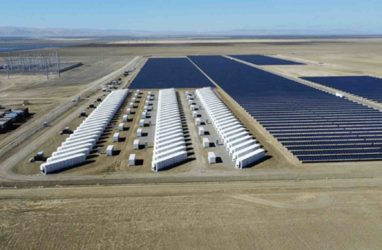Feed aggregator
California battles heavy floods with more rain and wind to come
Battery industry could be worth $27 billion to Australian economy by 2030
 The full battery opportunity won't be unlocked, however, unless Australia puts in the policy and industry legwork first.
The full battery opportunity won't be unlocked, however, unless Australia puts in the policy and industry legwork first.
The post Battery industry could be worth $27 billion to Australian economy by 2030 appeared first on RenewEconomy.
Difficulties in following the money impeding voluntary carbon market clarity, project climate value -experts
“World’s biggest” solar and battery storage offtake deal to deliver giga-scale projects
 Saudi developer secures agreements to build three solar plus storage projects in one of the world’s largest power purchase deals.
Saudi developer secures agreements to build three solar plus storage projects in one of the world’s largest power purchase deals.
The post “World’s biggest” solar and battery storage offtake deal to deliver giga-scale projects appeared first on RenewEconomy.
Officials challenged to drink town water where millions of fish died in Australian river – video
Officials at a heated town meeting in Menindee, outback New South Wales, are challenged to drink a mug of town water in front of the crowd after assuring the community that it meets Australian drinking water standards. The request is issued by Jan Fennell, a resident who says the town is tired of being given instructions by authorities without being granted meaningful involvement or reassurances
- Menindee residents ask officials to drink town’s water as reassurance after massive fish kill
- ‘All this here will kill this river’: traditional owners grieve for the Darling-Baaka after mass fish death
Number of city dwellers lacking safe water to double by 2050
UN report predicts water demand will increase by 80% as crisis threatens to get out of control
The number of people lacking access to safe drinking water in cities around the world will double by 2050, research has found, amid warnings of an imminent water crisis that is likely to “spiral out of control”.
Nearly 1 billion people in cities around the world face water scarcity today and the number is likely to reach between 1.7 billion and 2.4 billion within the next three decades, according to the UN World Water Development Report, published on Tuesday ahead of a vital UN summit. Urban water demand is predicted to increase by 80% by 2050.
Continue reading...Badger tunnels halt traffic on Dutch railways
No new fossil fuels? Australia has 116 new coal, oil and gas projects in the pipeline
 The Australia Institute lists the nation's 116 new fossil fuel projects and the massive carbon bomb that they will set off if they all proceed as planned.
The Australia Institute lists the nation's 116 new fossil fuel projects and the massive carbon bomb that they will set off if they all proceed as planned.
The post No new fossil fuels? Australia has 116 new coal, oil and gas projects in the pipeline appeared first on RenewEconomy.
Utility CEZ reports 5% drop in ETS-covered power output for 2022
Labor was presented with a fait accompli on Aukus, but scepticism in the party is rightly rising | Kim Carr
We were not given a chance to scrutinise the nuclear submarine deal, and critical questions remain unanswered
- The three big questions Australia’s leaders must answer about the Aukus deal | Gareth Evans
- Follow our Australia news live blog for the latest updates
- Get our morning and afternoon news emails, free app or daily news podcast
On the morning of 16 September 2021, the federal ALP caucus was presented with the shadow cabinet’s fait accompli of support for the Morrison government’s Aukus submarine deal.
Caucus members were told that on the previous afternoon, the leader, Anthony Albanese and several shadow ministers had received a two-hour briefing on the proposal from the government. No documents were provided at the briefing. On the basis of that, and the shadow ministry’s endorsement, Labor MPs were expected to leap into bipartisan support for the Aukus deal.
Sign up for Guardian Australia’s free morning and afternoon email newsletters for your daily news roundup
Continue reading...Voluntary carbon demand to taper off for avoidance, ramp up for removals -analyst
Solar and wind still best bets for deep, rapid and low cost emission cuts
 IPCC says solar and wind will deliver easily the biggest and lowest cost emission cuts over the next 10 years.
IPCC says solar and wind will deliver easily the biggest and lowest cost emission cuts over the next 10 years.
The post Solar and wind still best bets for deep, rapid and low cost emission cuts appeared first on RenewEconomy.
UK fishing vessels ‘underreporting’ whale, dolphin and porpoise bycatch
Only 19 cases of cetacean bycatch reported under Defra scheme, but experts say figure much higher
Only a handful of instances of accidental bycatch of whales, dolphins and porpoises have been recorded under the UK government’s self-reporting initiative, despite the likelihood that hundreds are being caught by fishing vessels.
Fishers have been encouraged to voluntarily record the bycatch of marine mammals in an attempt to reduce the accidental catch, which would benefit the fishing industry and the health of the seas.
Continue reading...New research reveals how forests reduce their own bushfire risk, if they're left alone
Species don't live in isolation: what changing threats to 4 marsupials tell us about the future
Academics call for tighter forest carbon methodologies to prevent over-crediting
Drax halts BECCS plans, seeks clarity on UK government support
UAE commitment to lead COP28 in “no way” detracted by oil interests, says Egypt
Concerns mount that Franco-German deal would put EU climate goals at risk
Hundreds of trees to be felled for Cambridge bus route to tackle climate change
Councillors vote to chop down trees in Coton Orchard for busway from Cambridge to Cambourne
Hundreds of trees in an orchard designated as a habitat of principal importance in England should be felled to build a new busway to tackle climate change, councillors in Cambridgeshire voted on Tuesday.
The county council voted by 33 to 26 to approve a new public transport busway, which will use optically guided electric or hybrid buses on its route, to provide links between Cambridge and Cambourne, an expanding new town eight miles outside the city.
Continue reading...


